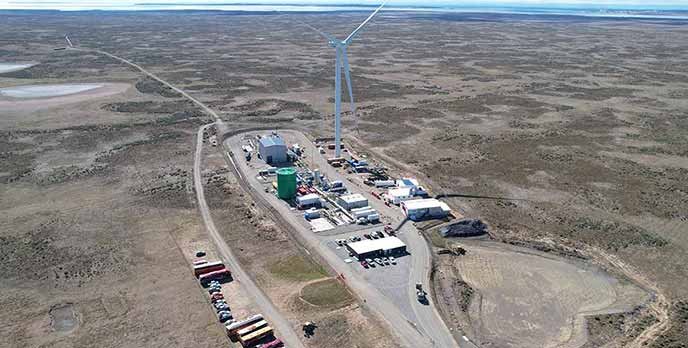Porsche opens eFuels pilot plant in Chile
28 Dec 2022|908 views
Porsche has opened the 'Haru Oni' pilot plant in Punta Arenas, Chile on 20 December 2022. Porsche Executive Board members Barbara Frenkel and Michael Steiner performed the ceremonial fuelling of a Porsche 911 with the first synthetic fuel produced at the site. eFuels made from water and carbon dioxide using wind energy enable the nearly carbon dioxide-neutral operation of petrol engines.
In the pilot phase, eFuel production of around 130,000 litres per year is planned. Initially, the fuel is to be used in lighthouse projects such as the Porsche Mobil 1 Supercup, and at Porsche Experience Centers.

 The south of Chile offers ideal conditions for production of eFuels due to wind blowing for around 270 days a year After the pilot phase, the first scaling will take the project in Chile up to a projected 55 million litres per year by the middle of the decade. Around two years later the capacity is expected to be at 550 million litres.
The south of Chile offers ideal conditions for production of eFuels due to wind blowing for around 270 days a year After the pilot phase, the first scaling will take the project in Chile up to a projected 55 million litres per year by the middle of the decade. Around two years later the capacity is expected to be at 550 million litres.
Porsche states that the south of Chile offers ideal conditions for the production of eFuels, with the wind blowing for around 270 days a year and therefore enabling the wind turbines to operate at full capacity. From the port of Cabo Negro, the synthetic eFuel can be transported just like traditional fuels all over the world, and be distributed using existing infrastructure.
Porsche is working towards a carbon dioxide-neutral balance sheet across the entire value chain by 2030. This also includes a carbon dioxide-neutral usage phase for fully electric future models. Synthetic fuels supplement electromobility and are part of the sports car manufacturer's sustainability strategy.
In the pilot phase, eFuel production of around 130,000 litres per year is planned. Initially, the fuel is to be used in lighthouse projects such as the Porsche Mobil 1 Supercup, and at Porsche Experience Centers.

Porsche states that the south of Chile offers ideal conditions for the production of eFuels, with the wind blowing for around 270 days a year and therefore enabling the wind turbines to operate at full capacity. From the port of Cabo Negro, the synthetic eFuel can be transported just like traditional fuels all over the world, and be distributed using existing infrastructure.
Porsche is working towards a carbon dioxide-neutral balance sheet across the entire value chain by 2030. This also includes a carbon dioxide-neutral usage phase for fully electric future models. Synthetic fuels supplement electromobility and are part of the sports car manufacturer's sustainability strategy.
Porsche has opened the 'Haru Oni' pilot plant in Punta Arenas, Chile on 20 December 2022. Porsche Executive Board members Barbara Frenkel and Michael Steiner performed the ceremonial fuelling of a Porsche 911 with the first synthetic fuel produced at the site. eFuels made from water and carbon dioxide using wind energy enable the nearly carbon dioxide-neutral operation of petrol engines.
In the pilot phase, eFuel production of around 130,000 litres per year is planned. Initially, the fuel is to be used in lighthouse projects such as the Porsche Mobil 1 Supercup, and at Porsche Experience Centers.

 The south of Chile offers ideal conditions for production of eFuels due to wind blowing for around 270 days a year After the pilot phase, the first scaling will take the project in Chile up to a projected 55 million litres per year by the middle of the decade. Around two years later the capacity is expected to be at 550 million litres.
The south of Chile offers ideal conditions for production of eFuels due to wind blowing for around 270 days a year After the pilot phase, the first scaling will take the project in Chile up to a projected 55 million litres per year by the middle of the decade. Around two years later the capacity is expected to be at 550 million litres.
Porsche states that the south of Chile offers ideal conditions for the production of eFuels, with the wind blowing for around 270 days a year and therefore enabling the wind turbines to operate at full capacity. From the port of Cabo Negro, the synthetic eFuel can be transported just like traditional fuels all over the world, and be distributed using existing infrastructure.
Porsche is working towards a carbon dioxide-neutral balance sheet across the entire value chain by 2030. This also includes a carbon dioxide-neutral usage phase for fully electric future models. Synthetic fuels supplement electromobility and are part of the sports car manufacturer's sustainability strategy.
In the pilot phase, eFuel production of around 130,000 litres per year is planned. Initially, the fuel is to be used in lighthouse projects such as the Porsche Mobil 1 Supercup, and at Porsche Experience Centers.

Porsche states that the south of Chile offers ideal conditions for the production of eFuels, with the wind blowing for around 270 days a year and therefore enabling the wind turbines to operate at full capacity. From the port of Cabo Negro, the synthetic eFuel can be transported just like traditional fuels all over the world, and be distributed using existing infrastructure.
Porsche is working towards a carbon dioxide-neutral balance sheet across the entire value chain by 2030. This also includes a carbon dioxide-neutral usage phase for fully electric future models. Synthetic fuels supplement electromobility and are part of the sports car manufacturer's sustainability strategy.
Latest COE Prices
July 2025 | 2nd BIDDING
NEXT TENDER: 06 Aug 2025
CAT A$101,102
CAT B$119,101
CAT C$68,600
CAT E$120,000
View Full Results Thank You For Your Subscription.



















